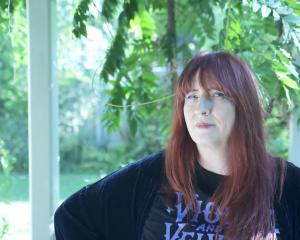
An impressive biography and collected poems of the late great Allen Curnow are a treat, writes Hamesh Wyatt.
ALLEN CURNOW: SIMPLY BY
SAILING IN A NEW DIRECTION:
A biography
Terry Sturm, edited by Linda Cassells
Auckland University Press
ALLEN CURNOW: COLLECTED POEMS
Edited by Elizabeth Caffin & Terry Sturm
Auckland University Press
By HAMESH WYATT

Auckland University Press has published the impressive, heavy and handsome limited edition slipcase Allen Curnow: Simply by Sailing in a New Direction: A Biography, and Allen Curnow: Collected Poems. The title for the biography comes from the opening line of Landfall in Unknown Seas commemorating the 300th anniversary of the discovery of New Zealand. The biography is a 700-page overview of this important poet's career. The Collected Poems is almost 400 pages.
Curnow, the son of an Anglican clergyman, with a "head full of poetry'', moved from vicarage to Canterbury vicarage when he was young: Belfast, Sheffield, Lyttelton. These are all revisited in later poems. Curnow himself trained for ministry at St John's Theological College. In Auckland Curnow was gripped by the literary crowd grouped around the Phoenix literary journal.
Terry Sturm, the author of this impressive biography, died in May 2008. He had been a student of Curnow's at Auckland University. Sturm completed a 465,000-word first draft. His widow and literary executor, Linda Cassells, trimmed it down to 295,000 words. Curnow is a giant in New Zealand literature. His poems are edited by Elizabeth Caffin and Terry Sturm.
Curnow was born in 1911. He talked of the language of modern disenchantment. In him, you find the makings of a viable nationalist subject, an anti-hero, an anti-prophet from his critical anti-myth. He famously put together his anthology A Book of New Zealand Verse 1923-1945 (Caxton, 1945) and The Penguin Book of New Zealand Verse (1960).

Curnow had an anti-pastoral vision of New Zealand. For seven decades he found new ways of feeling resonantly glum. But more than this, Curnow's poetry represented New Zealand. He was a pioneer in new poetry out of the volcanic earth, the overcooked hills, the clumsy birdlife and the steaming mangroves that make up our country.
Curnow was the first New Zealand poet to adopt the sonnet with a full sense of history and put it to his own localised uses. These include Dunedin, Polynesia and Sailing or Drowning.
This new Collected Poems has brilliant diction and form. His language and syntax are often startling. He joins together monosyllabic words "dead hot calm'', "blood noon tide'' that unsettle the reader. The opening line "A gulp of sea air, the train'' (from Do Not Touch the Exhibits) draws the reader in. Curnow's poems have always been vehicles for local details and stories which subtly glimpse the country and the history he was telling us. The tone is usually unsatisfactory, inglorious, unromantic. Curnow never understood why his poem Wild Iron was so popular, even with its shades of T.S. Eliot, W.B. Yeats and Dylan Thomas.
Curnow penned so many poems that were tough and unrelenting. Dichtung und Wahrheit is a biting satire. This is an inexplicably violent and hurtful pastiche of novelist and departmental colleague at Auckland University, M.K. Joseph's A Soldier's Tale (1976). Strong moral, political and social feelings are close to the surface.
Poets such as James K Baxter, Alistair Campbell and Louis Johnson were often at odds with Curnow. They did not like how he seemed to decide who was and who wasn't deserving of inclusion in the New Zealand literary canon. Curnow did not like Eileen Duggan, among others. He felt she had traces of perceptiveness and an air of lyric movement, but the overall effect of "that of an emotional cliche''. Curnow could be tough. His own mind would be ruminating on itself in a compelling, chilling circularity. You can see this in his poems. Georgian excesses were all removed: sentimental, weak, romantic, pretty poems, sometimes playing with Maori words and imagery in a crass way. There is nothing trivial about Curnow's poems.

Collected Poems includes his first three volumes of poems, long out of print. It follows a conventional chronological order. The book does not include early poems published in journals and periodicals but these are available online. Light verse by Whim Wham will not be found here as Curnow insisted in keeping him separate from the serious poet, nor are there any selections from his verse dramas. It is sad that Jeny Curnow, his widow, did not live to see either his Collected Poems or the biography in print.
Curnow had the dedicated ear and eye of a poet. He had a lifetime pursuit of the perfect poem. He said: "It's possibly not farfetched to guess that the Church with its orders and trappings was at the bottom of all this. Besides, I was genuinely thankful to escape from a profession I never loved much and had come to detest.''
Listening to Curnow reading a poem was an amazing experience. He sounded lofty, polite and rhapsodic.
"A Refusal to Read Poems of James K. Baxter at a Performance to Honour his Memory in Cranmer Square, Christchurch'':
Jim, you won't mind, will you,
if I don't come to your party?
One death is enough, I won't kill you
over again, ritually,
being only one other poet
who knew you younger and never better,
I would hardly know under which hat or which crown
to salute you now -
bays, or myrtles, or thorns,
or which of them best adorns
that grave ambiguous brow.
The quandary's mine, yours too,
Jim, isn't there always too much
we don't understand, too much that we do?
Winged words need no crutch,
and I've none for you.
Curnow was made a CBE in 1986, won the Commonwealth Poetry Prize in 1988, received the Queen's Gold Medal for Poetry in 1989 and the Order of New Zealand in 1990. Throughout his life he had an awareness of death and ageing. He missed his literary friends. By the time he died in 2001, aged 90, Curnow had become the great-grandfather of New Zealand poetry. Since the 1930s he had been chronicling what he called New Zealand's "unhistoric story''. Curnow was never casual, even if he appeared to be so at times.

Fast forward again
top-heavy Alpes
Maritimes grind
the sky small. One
more dull day scraped
off a slaty sea.
Get this one, even with the expensive price tag. The whole thing is magnificent.
Hamesh Wyatt lives in Bluff. He reads and writes poetry.












